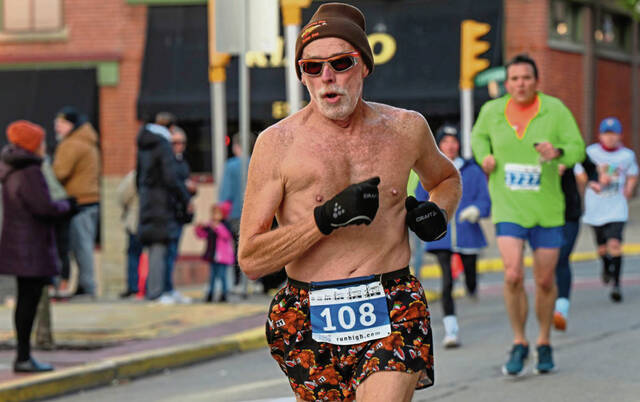Groundbreaking geneticist, Hempfield grad to kick off annual Greensburg Turkey Trot
A longtime runner and Hempfield Area graduate whose work on a rare genetic disorder has helped a young girl begin to walk will be returning home on Thanksgiving Day to officially start the Greensburg Turkey Trot race co-founded by his father.
Dr. Caleb Bupp, 41, a medical geneticist living in Grand Rapids, Mich., was 9 when his father, Greensburg pediatric dentist Dr. Barry Bupp, began the annual Turkey Trot as a charitable fundraiser with several lunchtime running partners.
Since then, Caleb Bupp has joined his father nearly every year in completing the 5K run/walk.
“He maybe missed one or two years when he was in medical school,” said Barry Bupp.
“It’s an incredible honor,” Caleb Bupp said of his upcoming role as honorary race starter.“My closet is full of Turkey Trot T-shirts.
“I don’t know a Thanksgiving without the Greensburg Turkey Trot. I don’t know how people eat a Thanksgiving meal if they haven’t run or walked a 5K.”
Caleb Bupp has been running since he was in middle school and continues to run several times each week.
He inherited his penchant for running from both of his parents. His mother, Gail, who lost a battle with cancer in 2016, designed many of the Turkey Trot shirts.
Choosing Caleb Bupp to start this year’s race “is a small way for our community to honor his accomplishments and the Bupp family,” said Mark Sorice, who chairs the race committee.
In his role as division chief of medical genetics and genomics with Michigan-based Corewell Health and Helen DeVos Children’s Hospital, Caleb Bupp helped to identify and promote treatment for a rare genetic disorder named for him and colleague Dr. Andre Bachmann, a professor of pediatrics at Michigan State University’s College of Human Medicine.
Only a dozen children from around the globe have been diagnosed with Bachmann-Bupp Syndrome, with symptoms including total hair loss, an enlarged head, low muscle tone and developmental delays.
For Bupp, the work of unlocking the key to the condition began when he became involved with the case of a girl, now 9, who displayed the above symptoms when she was less than a year old.
“This was a new condition that had never been seen before, and we had a theory that we might be able to treat it using a drug that had been around for 50 years,” Bupp said.
Bupp and his research colleague traced the disorder to a mutation in a gene important in metabolism and human growth.
Nonhuman studies of the gene had been underway at Michigan State and in separate research involving mice in Pennsylvania.
According to Bupp, the researchers made the connection to a drug that had been developed in the 1970s as a potential treatment for cancer and for West African sleeping sickness.
“There were mice that had changes in this gene and lost their hair,” Bupp said. “When they gave them this drug, they regrew their hair.”
The researchers got early approval to use the drug to provide compassionate care to the young girl with the disorder about five years ago, when she was 3.
Now, the girl “is starting to do some walking,” Bupp said. “She is able to do sign language and has regrown all of her hair. It’s been awesome.”
Bupp and Bachmann’s work researching the syndrome and similar genetic disorders has been assisted by a $4 million grant from the National Institutes of Health.
“We’ve heard from other patients around the world,” said Bupp. “Their families have been incredibly gracious. They’ve taken the leap of faith with us. We’ve seen really wonderful results.”
Jeff Himler is a TribLive reporter covering Greater Latrobe, Ligonier Valley, Mt. Pleasant Area and Derry Area school districts and their communities. He also reports on transportation issues. A journalist for more than three decades, he enjoys delving into local history. He can be reached at jhimler@triblive.com.
Remove the ads from your TribLIVE reading experience but still support the journalists who create the content with TribLIVE Ad-Free.




